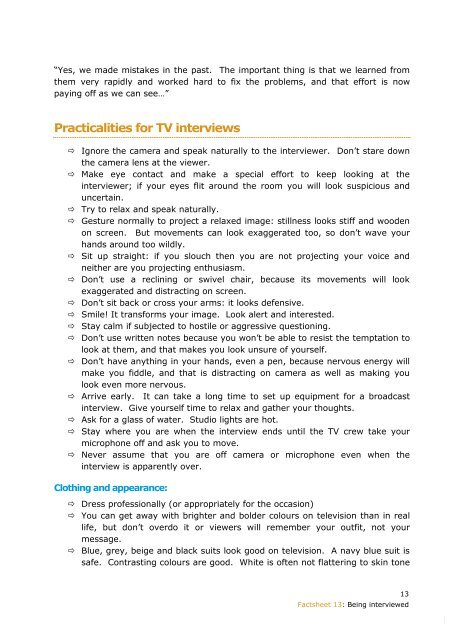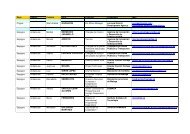MED Communication Handbook - Programme Med
MED Communication Handbook - Programme Med
MED Communication Handbook - Programme Med
Create successful ePaper yourself
Turn your PDF publications into a flip-book with our unique Google optimized e-Paper software.
“Yes, we made mistakes in the past. The important thing is that we learned from<br />
them very rapidly and worked hard to fix the problems, and that effort is now<br />
paying off as we can see…”<br />
Practicalities for TV interviews<br />
� Ignore the camera and speak naturally to the interviewer. Don’t stare down<br />
the camera lens at the viewer.<br />
� Make eye contact and make a special effort to keep looking at the<br />
interviewer; if your eyes flit around the room you will look suspicious and<br />
uncertain.<br />
� Try to relax and speak naturally.<br />
� Gesture normally to project a relaxed image: stillness looks stiff and wooden<br />
on screen. But movements can look exaggerated too, so don’t wave your<br />
hands around too wildly.<br />
� Sit up straight: if you slouch then you are not projecting your voice and<br />
neither are you projecting enthusiasm.<br />
� Don’t use a reclining or swivel chair, because its movements will look<br />
exaggerated and distracting on screen.<br />
� Don’t sit back or cross your arms: it looks defensive.<br />
� Smile! It transforms your image. Look alert and interested.<br />
� Stay calm if subjected to hostile or aggressive questioning.<br />
� Don’t use written notes because you won’t be able to resist the temptation to<br />
look at them, and that makes you look unsure of yourself.<br />
� Don’t have anything in your hands, even a pen, because nervous energy will<br />
make you fiddle, and that is distracting on camera as well as making you<br />
look even more nervous.<br />
� Arrive early. It can take a long time to set up equipment for a broadcast<br />
interview. Give yourself time to relax and gather your thoughts.<br />
� Ask for a glass of water. Studio lights are hot.<br />
� Stay where you are when the interview ends until the TV crew take your<br />
microphone off and ask you to move.<br />
� Never assume that you are off camera or microphone even when the<br />
interview is apparently over.<br />
Clothing and appearance:<br />
� Dress professionally (or appropriately for the occasion)<br />
� You can get away with brighter and bolder colours on television than in real<br />
life, but don’t overdo it or viewers will remember your outfit, not your<br />
message.<br />
� Blue, grey, beige and black suits look good on television. A navy blue suit is<br />
safe. Contrasting colours are good. White is often not flattering to skin tone<br />
13<br />
Factsheet 13: Being interviewed<br />
�








